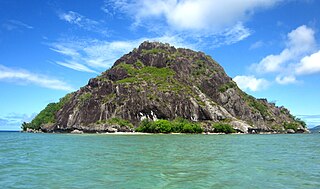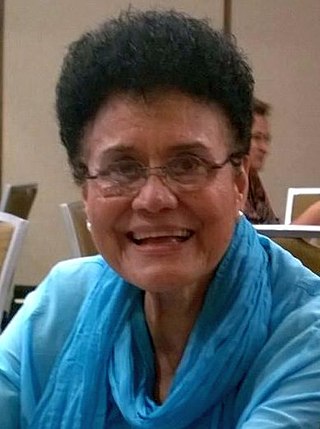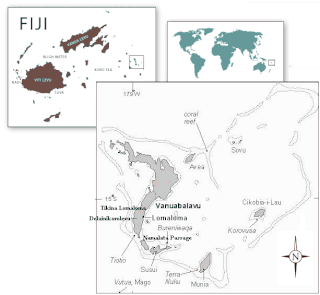The House of Chiefs in Fiji consists of the Fijian nobility, composed of about seventy chiefs of various ranks, majority of which are related. It is not a formal political body and is not the same as the former Great Council of Chiefs, which was a political body with a prescribed constitutional role, although the membership of the two bodies did overlap to a great extent.

Kubuna is one of the three confederacies that make up Fiji's House of Chiefs, to which all of Fiji's chiefs belong.
Tovata is one of three confederacies comprising the Fijian House of Chiefs, to which all of Fiji's chiefs belong.
Naitasiri is one of the 14 provinces of Fiji and one of eight located on Viti Levu, Fiji's largest island.

Ra is one of the fourteen provinces of Fiji. Occupying the northern area of Viti Levu, the largest island, it is one of eight Viti Levu-based Provinces. With a land area of 1,341 square kilometers, it had a population of 30,432 in 2017 census. The main urban centre is at Vaileka, with a population of 3,361 in 1996.
Ratu Aisea Cavunailoa Katonivere was a Fijian chief and politician who hailed from the chiefly village of Naduri from the northern Province of Macuata, where he was the Paramount Chief and Chairman of the Provincial Council. He held the title of Caumatalevu na Turaga na Tui Macuata, which is usually abbreviated to Tui Macuata.

Lomaloma is a village at the south of the island of Vanua Balavu in the Lau archipelago of Fiji. The settlement is part of the tribal district of Tikina, Lomaloma and consists of 9 villages, 13 Yavusa (tribes), 42 Mataqali (clans), and 54 family units known as Tokatoka. The nine villages of Lomaloma Tikina are Lomaloma, Sawana, Susui, Narocivo, Namalata, Uruone, Levukana, Dakuilomaloma, and Tuvuca.

Adi Mere Tuisalalo Samisoni was a Fijian businesswoman and politician, from Lomaloma village on the island of Vanua Balavu in Fiji's Lau archipelago. Samisoni was formerly a member of Parliament for the opposition party SODELPA. She served as mayor of Lami and as a member of the now-defunct House of Representatives.
Elenoa Serukeirewa (1875–1930) was a Fijian Adi (chief), the daughter of Ro Waisea. L. Qioniwailevu and Adi Veniana Draukibei. Ro Waisea was the "Vunivalu na Vosaibaleni" of the Yavusa Nawainovo from the tokatoka Nauluvatu. Adi Elenoa was the last member of this lineage. Before she died in 1930, she held the title "Vunivalu na Vosaibaleni", inheriting it from her father. She was also the last person to have been installed to this position. Her village was Kasavu, now located in the province and district of Naitasiri. Formerly, this village consisted of three tribes, including the Yavusa Nawainovo, where the "Marama na Vunivalu" is from, and which comprises the Mataqali Vunivesi. The other two tribes were the Yavusa Sawa, consisting of the Mataqali Rokoraite, and the Yavusa Burenitu, consisting of the Mataqali Aisokula, Rokotuinakoro, Vunileba, Tabuicovi and Naisogo. However, after the sitting of the Native Lands Commission the three tribes were combined into one known as the Burenitu tribe.
Queen Victoria School (QVS) is a school in Fiji. It was established in 1906 in Nasinu to provide education to the sons of Fijian Chiefs. It later moved to Nanukuloa in Ra when World War II broke out; then the school was moved to Lodoni where the two schools QVS and RKS operated side by side before eventually moving to its current site at Matavatucou, Tailevu. It then accepted students from Fijian villages based on their results in a secondary entrance examination.
Fijian tradition and ceremony is a living way of life that has evolved as the Fijian nation has modernised over time, with various external influences from Pacific neighbours, and the European and Asian society. This general overview of various aspects of Fijian tradition, social structure and ceremony, much of it from the Bauan Fijian tradition although there are variations from province to province, uses "Fijian" to mean indigenous Fijians or I Taukei rather than all citizens of Fiji, and the Fijian terms are most often of the Bauan dialect. Many social intricacies depend on one's inherited social position and the occasion one is confronted with: each will have a particular social etiquette.

Turaga na Rasau is a traditional Fijian chiefly title of the Lau Islands. Prior to Fiji's colonial days, Fiji had many different Vanua with their own Paramount Chieftain which exercised no authority over the other; a saying from the island of Kadavu aptly summarises it "Nomu Turaga o sega na noqu Turaga" or "Your Chief is not my Chief" also the people of Beqa Island were of a similar opinion saying "Qali Cuva Ki Lagi" or "Subject only to heaven" and would bow to no outside Chieftain, but at the turn of the 20th century aspects of the traditional social structure remained, but for administrative purposes three main Matanitu were solidified and formed as they were the dominant consolidated powers at the time being that of Kubuna, Burebasaga and Tovata. With regard to the Rasau while its traditional origins were in Kubuna on Bau the titles traditional authority in modern Fiji is now in Tovata, Lau in particular Lomaloma Tikina on the Island of Vanua Balavu.
The Turaga na Ravunisa is a Fijian Chiefly title of the Lau Islands, in particular the village of Lomaloma on the Island of Vanua Balavu.
Taukei ni Waluvu is a Fijian phrase for "Owner of the Flood." It is the traditional chiefly title of the warrior hill clan Siko-Natabutale of Nairukuruku village. The history of the clan from the mid- nineteenth century, represent the social structures of the chiefly system, religion and western culture that supported colonialism in Fiji. Tradition, Christianity and British indirect rule were combined to legitimize what was accepted as the right way to govern. Condemned by some modern day critics as exploitative, the Fijian chiefly system was the medium of native social interdependence and a traditional contract shared by the indigenous clans of pre-colonial Fiji, that was utilized for colonial rule. Since Independence the chiefly system has had to adapt to the demands of modernity. Anthropologist Arthur Capell in his study of early tribal migration within Fiji made the point that, "the history of Fiji is the history of chiefly families." The phrase in fact emphasized the hierarchical nature of Fijian traditional society where chiefly power was held sacred. The relationship between Chiefs and Westerners in especially Missionaries thus became a focal point for gathering insight into Fijian culture and tradition in the nineteenth century. James Turner a latter anthropologist found, "The chiefly families of Nairukuruku were the first in the eastern highlands of Viti Levu to declare their allegiance to the central government and as a result of this support their influence expanded throughout the area".
Ratu Solomone Buaserau is a Fijian politician. Prior to the military coup of 5 December 2006, he was a member of the Senate of Fiji and represented Naitasiri Province. Ratu Solomone Buaserau married Adi Litia Vosailagi [daughter of the late Ratu Timoci Vosalagi - Turaga Na Kalevu, Na Tui Nadroga, and younger sister of Ratu Kinijoji Nanovo Vosailagi- late Turaga na Kalevu].
Bau is the main village on Bau Island, Fiji. Once integral to the power and economy of the chiefly village, the villages of Lasakau and Soso are also located on the twenty-two acre island which became the centre of traditional power throughout the Fiji Islands in the nineteenth century.

Verata is a tikina in Fiji's Tailevu Province. It is made up of several sub-districts or Tikina makawa, namely: Verata, Namalata, Tai, Vugalei, and Taivugalei.
In Fiji, Turaga na Roko Tui Bau is a vassal chief of the Vunivalu of Bau. From his seat at the residence of Naicobocobo, the Roko Tui Bau rules the Vusaratu chiefs and has relationships with the Roko Tui Dreketi, Ratu Mai Verata, Roko Tui Namata, Roko Tui Veikau, Tui Vuya and other members of Fiji's House of Chiefs.
Ratu Maculeku Rokocegu is a Fijian chief. The Paramount Chief of the Dreketi sub-district of Macuata Province, Rokocegu was involved in a mutiny at the Sukunaivalu Barracks in Labasa on 7 July 2000. Supporting the insurrection in Suva led by George Speight, rebels overran the Sukunaivalu Barracks, and also harassed Indo-Fijian civilians and led acts of civil disobedience within the surrounding area.

Navatu is a sub district in Cakaudrove; one of 3 provinces situated in Vanua Levu, the second largest island in Fiji. The sub-district, or "tikina" as it is known in the iTaukei language, comprises nine villages mainly occupying the eastern peninsular of the Natewa Bay. While Copra has been the main source of income for villages in the Navatu tikina, kava or yaqona is also becoming a fast growing commodity for villages within the Navatu sub-district.






